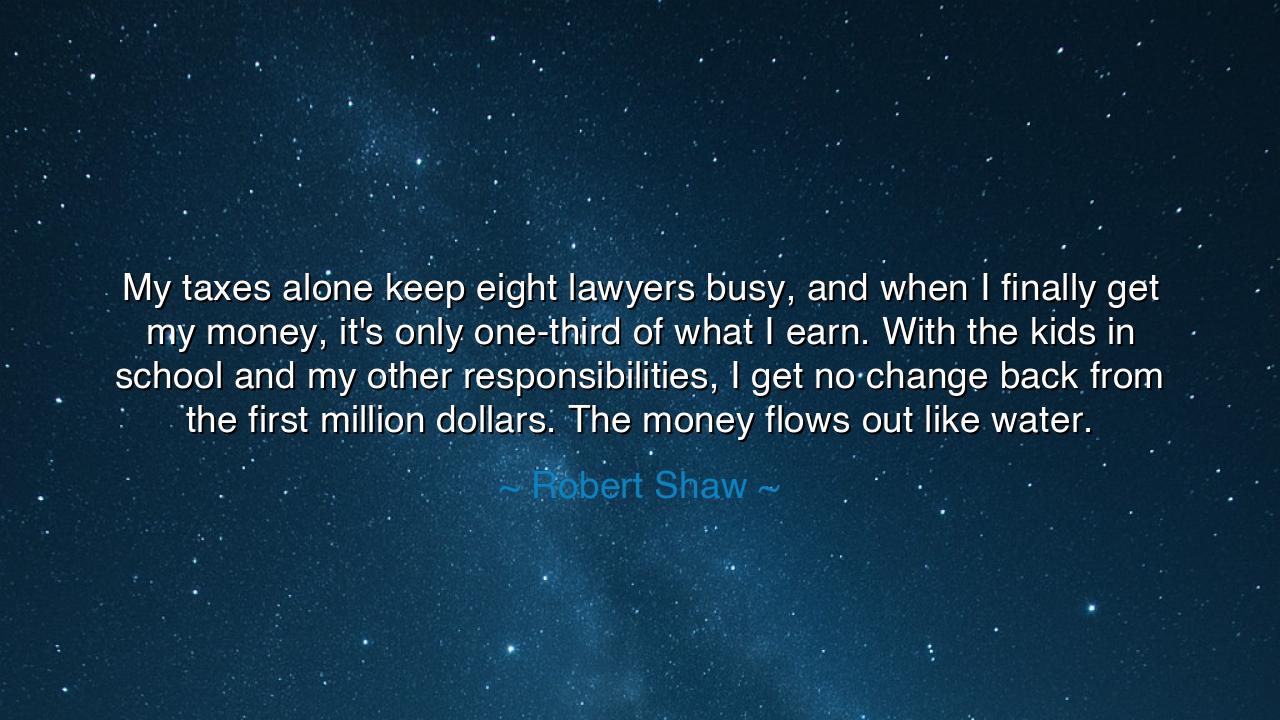
My taxes alone keep eight lawyers busy, and when I finally get my
My taxes alone keep eight lawyers busy, and when I finally get my money, it's only one-third of what I earn. With the kids in school and my other responsibilities, I get no change back from the first million dollars. The money flows out like water.






“My taxes alone keep eight lawyers busy, and when I finally get my money, it’s only one-third of what I earn. With the kids in school and my other responsibilities, I get no change back from the first million dollars. The money flows out like water.” — Robert Shaw
In these candid and weary words, Robert Shaw, the celebrated British actor and writer, unveils a truth that many have glimpsed but few dare to admit: that wealth does not free a man from struggle, it merely changes its form. Shaw, who achieved fame through films such as Jaws and A Man for All Seasons, speaks not in boastfulness but in burden. Behind his words lies the cry of a man trapped in the relentless cycle of success — where every gain brings new obligations, and every fortune breeds unseen chains. “The money flows out like water,” he laments, painting an image both vivid and ancient: that riches, like a river, cannot be held in the hands of man.
The origin of this quote springs from Shaw’s own life during the height of his career. Though acclaimed for his brilliance on stage and screen, he was a man constantly at war with his earnings, his taxes, and the machinery of fame. In an age when artists began to command great wealth, he saw firsthand how that wealth could vanish as swiftly as it came — devoured by lawyers, taxes, and the ceaseless demands of modern life. Yet beneath his frustration lies a deeper wisdom: that prosperity without peace is a hollow crown, and that the pursuit of material comfort often leaves the soul impoverished.
Shaw’s reflection calls to mind the ancient proverb that “gold is a faithful servant, but a terrible master.” The ancients understood what modern man forgets — that money is not power, but temptation. It promises freedom and brings bondage. The more one gathers, the more one must guard. The wealthy man builds walls, hires servants, consults lawyers — and each safeguard becomes a chain. Shaw’s confession that “eight lawyers” labor over his taxes speaks not merely of bureaucracy, but of the burden of abundance. He is not envied here but pitied, for his labor earns not leisure but entanglement.
History offers many such examples. Consider Marcus Licinius Crassus, the richest man in Rome, whose fortune could fund armies and buy kingdoms. Yet he, too, was consumed by the weight of his wealth. His riches brought him no joy, only ambition; and that ambition led him to a futile war in Parthia, where he died — his mouth filled, legend says, with molten gold, the very thing he desired most. Like Shaw, he learned too late that riches flow not toward peace, but toward peril, if the heart is not disciplined.
But Shaw’s lament is not a sermon against money; it is a lament for balance, for the simplicity that wealth erodes. He speaks of “kids in school” and “responsibilities” — the ordinary burdens that tether even the extraordinary. His voice is that of every man who has climbed high enough to see that fortune cannot still the storms of life. Money may feed the body, but it cannot feed the soul. It buys houses but not homes, and it sustains appearances while leaving the heart thirsty. His words echo the warning of the Stoics, who taught that contentment lies not in what one possesses, but in what one can let go.
And yet, Shaw’s confession carries not bitterness but realism. He does not curse his craft or renounce his earnings; he merely recognizes the law of flow — that what enters must also leave. “The money flows out like water.” So it has always been, and so it will always be. The wise do not seek to dam the river, but to learn how to drink wisely from its current. True prosperity, then, is not in hoarding but in harmony — in learning to balance gain with gratitude, work with rest, wealth with wisdom.
So, O listener, take this lesson from Robert Shaw’s weary wisdom: do not envy the rich, for their gold may weigh heavier than your empty hands. Learn instead to find sufficiency in simplicity. If fortune comes, receive it with humility; if it departs, let it go with grace. Do not chase the glitter that blinds, but the peace that endures. For in the end, it is not the fullness of one’s purse that determines happiness, but the quiet of one’s heart. As Shaw discovered, the truest wealth is not what flows into our hands, but what remains when all that flows away is gone.






AAdministratorAdministrator
Welcome, honored guests. Please leave a comment, we will respond soon